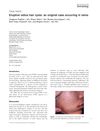 10 citations,
December 2011 in “Cell Transplantation”
10 citations,
December 2011 in “Cell Transplantation” Researchers successfully grew human hair follicle cells that could potentially lead to new hair loss treatments.
[object Object]  9 citations,
May 2015 in “Cardiology Clinics”
9 citations,
May 2015 in “Cardiology Clinics” The conclusion is that managing cholesterol is important for women, especially during pregnancy, breastfeeding, and with PCOS, and involves regular screening and careful treatment choices.
 9 citations,
April 2015 in “Dermatologic Therapy”
9 citations,
April 2015 in “Dermatologic Therapy” Hormonal therapies, like flutamide and cyproterone acetate, are safe and effective for treating adult women's acne, especially those with hormone imbalance or resistant acne.
 8 citations,
January 2020 in “Plastic and Aesthetic Nursing”
8 citations,
January 2020 in “Plastic and Aesthetic Nursing” The article concludes that different types of hair loss require specific treatments and psychological support is important.
 8 citations,
January 2017 in “Fertility and Sterility”
8 citations,
January 2017 in “Fertility and Sterility” Urologic diseases and treatments in older men can negatively affect fertility, and doctors should talk to patients about this.
 8 citations,
February 2009 in “Current Women's Health Reviews”
8 citations,
February 2009 in “Current Women's Health Reviews” Testosterone treatment can improve sexual function and bone density in women but may have adverse effects and requires more research on safety and guidelines.
 8 citations,
January 1989 in “Annual Reports in Medicinal Chemistry”
8 citations,
January 1989 in “Annual Reports in Medicinal Chemistry” Hair loss from alopecia areata and androgenetic alopecia can be treated, but more effective and safer treatments are needed.
 7 citations,
July 2019 in “Clinics in Dermatology”
7 citations,
July 2019 in “Clinics in Dermatology” Hair loss can indicate or worsen with systemic diseases, and treating the underlying condition is important.
 7 citations,
August 2018 in “South African Medical Journal”
7 citations,
August 2018 in “South African Medical Journal” Clinicians should understand tattoos to manage health issues, as tattoos can cause complications and affect medical assessments.
 7 citations,
April 2012 in “Clinical investigation”
7 citations,
April 2012 in “Clinical investigation” Transdermal testosterone can improve sexual desire in postmenopausal women but lacks long-term safety data and is not FDA-approved for this use.
 7 citations,
January 1993 in “Rheumatology”
7 citations,
January 1993 in “Rheumatology” Most skin rashes in rheumatoid arthritis patients were not caused by their medication, and careful evaluation allowed most to keep taking their beneficial treatment.
 6 citations,
February 1974 in “The BMJ”
6 citations,
February 1974 in “The BMJ” The document concludes that scalp disorders can be treated with hair washing, specific shampoos, medications, and sometimes surgery or hair transplants, but hereditary baldness is untreatable.
 5 citations,
July 2000 in “Southern Medical Journal”
5 citations,
July 2000 in “Southern Medical Journal” Male pattern baldness is often genetic and linked to a hormone, with treatments like finasteride and minoxidil being effective for some men.
 4 citations,
May 2024 in “The Lancet”
4 citations,
May 2024 in “The Lancet” Bariatric surgery improves ovulation rates in women with PCOS and obesity better than medical therapy.
 4 citations,
September 2018 in “International journal of research - granthaalayah”
4 citations,
September 2018 in “International journal of research - granthaalayah” Most female students at Qassim University know about PCOS, but there are still misunderstandings about it.
 4 citations,
July 2014 in “International Journal of Dermatology”
4 citations,
July 2014 in “International Journal of Dermatology” Twins had rare skin cysts likely due to genetics.
 4 citations,
June 2002 in “Clinical and experimental dermatology”
4 citations,
June 2002 in “Clinical and experimental dermatology” Effective treatment for hidradenitis suppurativa varies, with antibiotics commonly used and surgery as an option, but no single method is universally successful.
3 citations,
December 2023 in “Biomedicines” PRP therapy helps skin heal and improve by promoting cell growth and repair.
 3 citations,
January 2021
3 citations,
January 2021 Non-surgical treatments like thread lifts, PRP therapy, HIFU, and radiofrequency effectively rejuvenate and tighten facial skin.
 3 citations,
September 2014 in “Journal of obstetrics and gynaecology Canada”
3 citations,
September 2014 in “Journal of obstetrics and gynaecology Canada” Menopause often leads to lower sexual desire and discomfort during sex, but treatment should be personalized and only if it bothers the woman.
3 citations,
May 2012 in “BMC Endocrine Disorders” Early diagnosis and hormone therapy can significantly improve outcomes for post-partum pituitary insufficiency in resource-limited settings.
 3 citations,
January 2011 in “Female pelvic medicine & reconstructive surgery”
3 citations,
January 2011 in “Female pelvic medicine & reconstructive surgery” Hormones significantly affect women's sexual function, and more research is needed to improve treatments for sexual dysfunction with minimal side effects.
 3 citations,
January 2007 in “Elsevier eBooks”
3 citations,
January 2007 in “Elsevier eBooks” The document concludes that individualized treatment and lifestyle changes are important for managing menopause symptoms and health risks.
 3 citations,
November 1999 in “Journal of Cutaneous Medicine and Surgery”
3 citations,
November 1999 in “Journal of Cutaneous Medicine and Surgery” Examining scalp biopsies in different ways helps better diagnose hair loss types.
 3 citations,
February 1976 in “Pediatric Clinics of North America”
3 citations,
February 1976 in “Pediatric Clinics of North America” The conclusion is that effective cancer treatment often requires a combination of therapies, but must be carefully managed due to serious side effects and the risk of immunosuppression.
 2 citations,
June 2011 in “Expert Review of Dermatology”
2 citations,
June 2011 in “Expert Review of Dermatology” Female pattern hair loss involves thinning hair on crown and frontal scalp, diagnosed by hair ratio, and treated with minoxidil, antiandrogens, or hair transplantation.
 2 citations,
January 2011 in “Elsevier eBooks”
2 citations,
January 2011 in “Elsevier eBooks” Early treatment of acne is crucial to prevent scarring and psychological effects.
[object Object]  1 citations,
September 2023 in “Dermatology and therapy”
1 citations,
September 2023 in “Dermatology and therapy” More research is needed to find the best treatment for dissecting cellulitis of the scalp.
 1 citations,
January 2018 in “Recent clinical techniques, results, and research in wounds”
1 citations,
January 2018 in “Recent clinical techniques, results, and research in wounds” Using developmental signaling pathways could improve adult wound healing by mimicking scarless embryonic healing.
 1 citations,
October 2017 in “Elsevier eBooks”
1 citations,
October 2017 in “Elsevier eBooks” Antiandrogens can treat female hormonal conditions, but environmental ones may harm reproductive health.




























